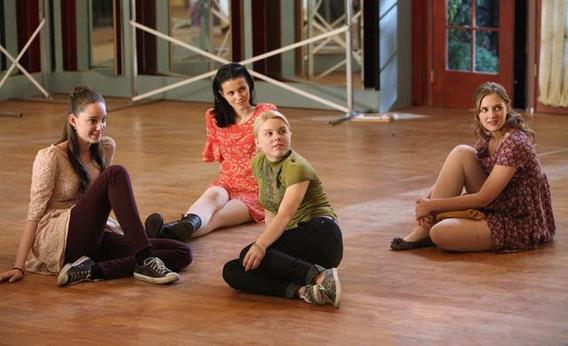Early in the pilot of the magnetic new comedy Bunheads (ABC Family, Mondays at 9 p.m.) comes a shot terrifically expressive of lost promise and showbiz frustration. It’s a cityscape depicting the land of broken dreams. Here is the Las Vegas Strip, in the back of the black desert. In the foreground, here is a courtyard apartment building resembling a dingy motel, as if it’s built around a pool last chlorinated in the ‘90s. On an upper story of the building, here stands heroine Michelle Simms (Sutton Foster), a bit like a broken doll.
Michelle is a dancer whose ABT training has secured her only a spot beneath a feathered headdress in a Las Vegas revue, and she has had a lousier day than usual. An audition for a real part, a part in Chicago, didn’t go well—not because she performed poorly but because she never got a chance. They looked at her aging frame and dismissed her, and it was over before she’d started. In the shot, you sense her regrets mounting as she stands outside her cruddy apartment, where her next-door neighbor is a literally a prostitute and everyone else, well ….
Michelle is caged and cornered. She can’t see the Strip in the distance, but we can, and it glows like an insincere Oz. Bunheads—created by Amy Sherman-Palladino, a cult heroine for her Gilmore Girls—is fast, frank, and in love with the business of show despite itself. It offers memorable looks at rehearsals, auditions, ballet-company competitions, and dreams of names in lights. And while it’s a very handsome improvement on Smash, it also, in its first episode, makes an unexpected narrative pirouette into Gilmor-ely territory. The mental landscape of the show is a kind of jaunty battlefield where a fusillade of smart talk is fired in intergenerational skirmishes.
Given Michelle’s desperation, it is unsurprising that she should leap into a marriage with a square Stage Door Johnny, a Californian who always brings her flowers when he’s in town on business. His name is actually Flowers, Hubbell Flowers, and despite his lovely manners, emotional presence, and healthy income, he leaves something to be desired as a romantic partner. Michelle is repelled by the fact that he wears running shoes with a suit. Her colleagues find it suspicious that he will take a flock of showgirls out to dinner without any expectations of quid pro quo. We at home see that Hubbell is played by Alan Ruck—once and forever Ferris Bueller’s Cameron Frye—and know that he’s going to be, on some level, not matter how kind or even poetic, a drip.
He takes Michelle out to a three-martini dinner. (That’s an average for the table; we get the impression that he has no martinis and she has six.) He proposes. She regains consciousness, the next day, in the shotgun seat of his Volvo, looks at her ring finger, and discovers that she has relented. He’s driving her home to coastal California to meet his mother. The meeting is as logistically simple as it is psychologically stunning: Mrs. Flowers inhabits the house and fills it with kitsch—and Kelly Bishop, Gilmore’s matriarch, inhabits the role with a kitsch-free kookiness.
Everyone’s a little off here: Mrs. Flowers affects a Russian grandiosity teaching ballet to the endearing girls budding in her dance studio behind the house and tells stories about Mr. Balanchine’s rehearsals: “We only stopped when someone finally dropped dead.” Meanwhile, Michelle scampers scattily. I got a kick out of seeing Sutton Foster play nightclub singer Reno Sweeney in Anything Goes on Broadway; here as there, she gives off thrilling waves of presence, as if always surprised that her body can dance the numbers and her mouth can spit such juicy ripostes. She is generous with this surprised joy, and that’s the spark she brings to reading lines that rattle with wisecracks, without self-regard.
“Wait, you live with your mother like a serial killer?” Michelle says to Hubbell when he drops the Mom Bomb. On a duller show, there would have been the pause of a question mark after mother, as a shticky set-up for the rest of the line, but Bunheads presses ahead at a fresher rhythm. Later, en route to the unsentimental heart-to-heart that bonds the show’s most important relationship, the mother-in-law says to Michelle: “Oh my god, the quips, the chatter, don’t you ever just shut up?” Thank heavens, no.
Bunheads
The new series about dancers from Amy Sherman-Palladino is delightful.

Photograph by Adam Taylor/ABC Family.
Advertisement